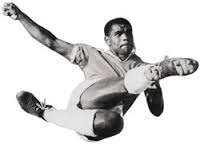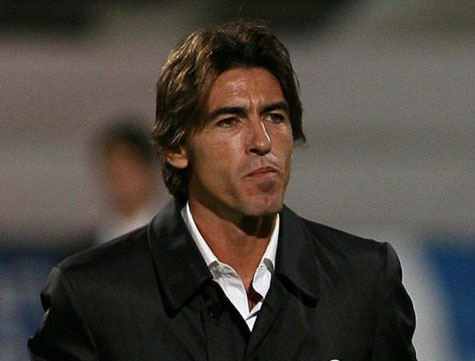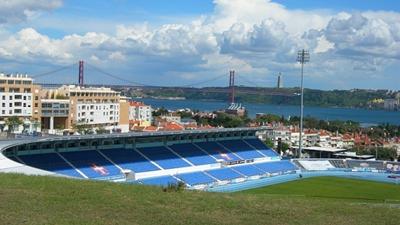When Belenenses secured a final day win in Gil Vicente’s modest Estádio Cidade de Barcelos, they not only confounded critics by rounding off a fantastic season of achievement (European qualification for the first time since 2007 was secured), but they restored a little bit of historical balance to Portuguese football that has been missing for some time.
The sometimes bleak landscape in Portugal, dominated so thoroughly by os tres grandes Benfica, FC Porto and - to a slightly lesser extent these days - Sporting, means there is simply little room for anybody else. When well-built sides like Braga, Estoril or Paços de Ferreira come through, as they have done intermittently over the past few seasons, they are immediately plucked down to a dry carcass every summer by the hovering eagles, prowling lions and fire-spitting dragons that lie in wait for them.
The rise and fall
Estoril, the latest in a longish line of small well-run clubs punching above their weight, also managed to qualify for Europe last season and gave, amongst others, Dutch champions-to-be PSV Eindhoven a run for their money in a tropical downpour in Group E of last season’s Europa League. Watching Estoril and a vastly more experienced PSV battle it out toe to toe in the diagonal winter rain that evening, it was hard to decide which club would go onto be champions of Holland and which would trundle home in a more modest 12th place in the Portuguese Liga. If PSV proved a step too far for the carefully constructed Estoril side, already derobed of the manager - Marco Silva - that had got them there, it was still a fantastic effort. In the league, however, they were back amongst the deadwood looking over their shoulders at the looming presence of relegation. And this is a recurring problem for the smaller clubs who punch briefly above their weight.
For Belenenses things are slightly different. For a club also used to looking over their shoulders in trepidation, 2014/15 provided a rare ray of light. The last day win in Barcelos presented one of Portugal’s oldest clubs with a reason to celebrate for once. For recent times have brought slim pickings down by the River Tejo.
Slumbering giants awakening?
A traditional old giant of pre-war Portuguese football, Belenenses is one of a tiny handful of clubs, who - given the right investment and the opportunity to grow - could once again flourish and provide some sort of challenge to the eternal Big Three.
In fact season 2014/15 had by its culmination a somewhat nostalgic look about it, with Boavista also back in the big time and securing a surprise mid-table finish under the astute stewardship of ex-Benfica schemer Petit.
Belenenses and Boavista represent the only teams that have wrested the Portuguese league title away from the hegemony at the top three since 1938, when league football was organised in the country.
For the Lisbon club in particular, it is a return to something of the glories of the distant past. Based in the well-off riverside district of Belém (or Bethlehem, to translate into English), nestling by the tourist hotspots of the Torre de Belém and the magnificent convent of Jeronimos, the club occupies not only a large chunk of prime real estate in one of Lisbon’s most sought after zones, but also lays claim to one of the most picturesque and powerful locations of any football club in the world.
Paradisiacal setting
From the press box, one has a view of the shimmering River Tejo, littered with cruise ships and sailing boats, the statue of Cristo Rei on the opposite bank and the mighty 25th April Bridge, linking the two distinct sides of the city. At the foot of the hill sits the vast presidential palace, where swarms of tourists take pictures of the immaculately dressed guards before heading off to find the original birthplace of Portugal’s famous Pasteis de Belém, the succulent puff pastry and custard tarts that fuel the city’s slow-moving but well-fed workforce.

It is all something of an idyll, a gentle paradise nursed by the wafting breezes off the river, where people stretch on the grass and excessive movement brings a retreat to drink more chilled wine. But this quiet corner of the city has acted as a complete nightmare for the club since its glory years in the early 50s, when brothers Matateu and Vicente, Portugal's first great African stars - even before the powerhouses of Eusébio and Mário Coluna stepped off the packboats from Lourenço Marques in Mozambique - rammed home goal after goal for the royal blues of Lisbon. Belenenses were a mighty draw in those heady days, packing in crowds of up to 50,000 to see that great side humble the best Portugal had to offer.
Drawing traditional support from the nearby docks, the fishing port and the seaside communities in Trafariá on the opposite bank of the Tejo, they represented a proper power base in those sepia-tinted days.
Sparse crowds
Those days have long gone and now the 22,000 capacity Restelo ground is lucky to be half full even for the visit of the Lisbon giants Benfica and Sporting and frequently registers attendances in the 2- and 3- thousands. A lackadaisical local public, more attracted by the botanical gardens in nearby Ajuda and the riverside cafés’ constant stream of grilled sardinhas and vinho verde, have tended to shun the club in its difficult times. Indeed no visible upsurge of support has been forthcoming this season, with attendances only marginally up on last year, despite the excitement of the chase for European places.
Still, it is a vast improvement on what went before. Since the last great title winning team faded into obscurity in 1948, the club has gradually lost ground on the elite in Portuguese football. As the spirit of Matateu faded, Benfica burst into the spotlight as the incoming power with a team built around the outrageous raw energy and technique of Eusébio and the commanding technical leadership of the indefatigable Mário Coluna.
The two Mozambicans helped usher in a glory period in the early 60s when Benfica briefly threatened to take Real Madrid’s European crown and wear it permanently themselves. The irony was not lost on Belenenses, a club that ten or more years before had been considered such a great footballing institution themselves that they had been the invitees to provide the opposition at Real Madrid’s stadium opening at the Estadio Real Madrid do Futbol, as the Bernabéu had at first been christened.
Still, they clung on to Benfica’s swirling coat tails for a while, embarking on their own European adventure in 1961, with a 3-3 Fairs Cup draw in Edinburgh against Hibernian. But Benfica were by now scooping up the honours and, crucially, taking a vast new generation of football supporters in Lisbon, the African colonies and the wider world with them. Much as the magic of the Bobby Charlton-Denis Law-George Best era at Manchester United created a worldwide fanbase for the club that endures to this day, so Benfica built their own rich heritage on the exploits of Eusébio, Coluna, Torres, Simões and Augusto.
Slow decline
Belenenses’ decline since then has been something of a typical Portuguese tale: gradual, gentle decay with nobody taking too much notice. It can be seen perhaps as a metaphor for the country as a whole, whose powerbase of Belém was where the great ships set out to explore and conquer large swathes of the unfound world, bringing back untold treasures and booty to Portugal. That colonial belle epoque also faded, leaving a country licking its wounds and feeling quietly sorry for itself. As the ships ceased to sail from the riverside quays in Belém, so Portugal’s grand sea-faring history came to a sad close. The colonial wars of the 60s and 70s once more saw activity down by the river, but now there were troops coming and going as Salazar’s closed state battled to keep its African possessions.
The mood at Belenenses had also started to change.
Demotion came in the early 80s with a little known Artur Jorge struggling at the helm and a bony kid called José Mourinho trying to persuade a doubtful public that he could play to a good enough standard. Felix, his father, had also passed through two decades before, donning the Belenenses goalkeeping gloves in the late 60s and early 70s. The club soon returned to the top flight, a little too soon perhaps, making the lackadaisical approach that had wrapped itself around the place ever more secure. Serious money troubles had also wrapped themselves around the club and its fast dwindling fanbase, drawn away by the continuing exploits on foreign fields of Benfica and Sporting. The people had seemingly left, never to come back again.
As recently as 2007 the club saw European action, however, after finishing beaten finalists in the Portuguese Cup, entertaining a powerful Bayern side in a half-full Restelo. Since then, things have been destined to get much worse before they got better. Another relegation, more financial woes and the real prospect that this fine old football institution was about to bite through the puff pastry crust for good.
Resurrection

But they came back, miraculously, from their stupor. Led off the field by the canny Brazilian financier Rui Pedro Soares, the club is once again on a sure-footing and fighting its way towards a rosier future. The sniff of big time football is once again filling the aristocratic noses of Restelo. A new manager, in the shape of the pugnacious Sá Pinto, gives the club an upwardly mobile feel. With him will come a better quality footballer, drawn to the stage by the river by the appeal of one of Portugal’s famous football faces.
Already, the ex-Sporting and Blackburn Rovers star Simon Vukcevic, a gladiatorial and somewhat contrary figure during his 77 games for Sporting, a career high which ended, ironically, with a 2-0 win at Belenenses. After a brief spell in North West England, he trailed around the Balkans before ending up playing for Levadiakos in the Greek league. Diminished reputation or not, these are the kinds of players the club may well look to in order to boost their status and upgrade their playing staff without damaging the fragile bank balance too much.
The economics of this sun-drenched but financially leaky nation dictate safety first, but down by the rippling shores of the Tejo, one or two people are beginning to allow themselves to dream once again of the great European nights that graced this most majestic of football stadiums. May they - and the missing fans - one day return in their droves.
By Simon Curtis


